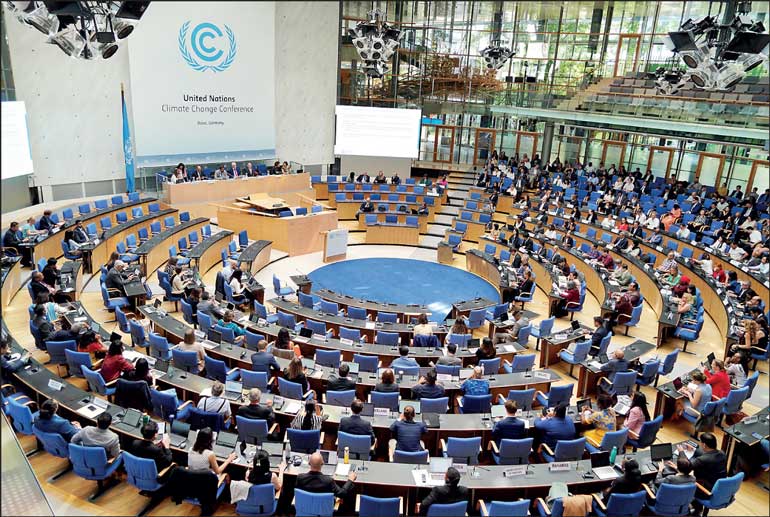Saturday Feb 14, 2026
Saturday Feb 14, 2026
Saturday, 24 June 2023 00:10 - - {{hitsCtrl.values.hits}}

From 5 to 15 June, the Bonn Climate Change Conference took place in Germany with thousands of
delegates from around the world – Pic credit: UNFCCC
 From 5 to 15 June, the Bonn Climate Change Conference took place in Germany with thousands of delegates from around the world. Formally the 58th sessions of the Subsidiary Bodies (SB58) of the United Nations Framework Convention on Climate Change (UNFCCC), the Conference sits at the midpoint between two larger meetings of the Conference of the Parties to the UNFCCC and the Paris Agreement, namely COP27 (November 2022) and COP28 (November/December 2023). It presents a chance to move the global climate negotiations ahead, make progress on different agenda items, and lay the groundwork for COP28, which will be in the focus of global media attention.
From 5 to 15 June, the Bonn Climate Change Conference took place in Germany with thousands of delegates from around the world. Formally the 58th sessions of the Subsidiary Bodies (SB58) of the United Nations Framework Convention on Climate Change (UNFCCC), the Conference sits at the midpoint between two larger meetings of the Conference of the Parties to the UNFCCC and the Paris Agreement, namely COP27 (November 2022) and COP28 (November/December 2023). It presents a chance to move the global climate negotiations ahead, make progress on different agenda items, and lay the groundwork for COP28, which will be in the focus of global media attention.
For developing countries such as Sri Lanka, key workstreams at the negotiations include those related to climate finance, a Global Goal on Adaptation, the Global Stocktake, support for addressing climate-induced loss and damage, carbon markets, response measures, just transition, food systems, oceans, technology transfer, knowledge exchange, capacity-building, and climate empowerment.
Climate finance
During the two weeks of the conference, negotiations proved to be complex and often slow-moving. Negotiators made progress on some key agenda items while others will have to be carried forward to COP28. As the agenda for SB58 was only formally adopted in the middle of week two, much of the negotiations proceeded under a provisional agenda and in the shadow of ongoing disagreements over priorities, climate finance, and the Sharm el-Sheikh Mitigation Ambition and Implementation Work Programme.
Regarding climate finance, Parties to the Paris Agreement must decide on a new collective quantified goal, which should be decided by COP29 and will come into effect from 2025 onwards. This goal would then replace the existing goal of $ 100 billion per year, which developed countries are supposed to collectively provide to developing countries to support climate action. However, since 2020, developed countries have not yet supplied the full target amount of $ 100 billion in full.
In the face of increasingly intense and frequent climate change impacts, this money is urgently needed to reduce emissions, transition away from fossil fuels, and build the resilience of economies and communities. In addition to the financial goal under the UNFCCC, there has also been discussion on a wider reform of the global financial system, for example, through the proposals contained under the “Bridgetown Agenda” or in the context of discussions around funding arrangements for loss and damage.
Climate change adaptation and loss and damage
Adaptation is the process of adjusting to climate change to minimise its negative impacts, while loss and damage refers to those impacts that exceed the theoretical or practical limits of adaptation. In the negotiation process at SB58, adaptation was discussed under agenda items such as those on the Global Goal on Adaptation, the Nairobi Work Programme, and the National Adaptation Plans, while loss and damage was focused on the Santiago Network and the so-called Glasgow Dialogue.
Especially in connection with finance, this is one of the key areas for developing countries to engage, as they need funding, technology, technical support, capacity-building, and other resources to respond to the challenges of climate change and increase their resilience. Highlighting country case studies and evidence from the local and national level can strengthen the position of negotiators and highlight key needs, existing mechanisms, and opportunities for investment, for example in connection to the loss and damage fund established at COP27, which is scheduled to decide its operational modalities at COP28.
The Global Stocktake
Similar to the Global Goal on Adaptation, the Global Stocktake (GST) is meant to assess the world’s collective process towards achieving the goals of the Paris Agreement regarding mitigation, adaptation, and means of implementation. The Bonn Conference saw the third meeting of the technical dialogue and the completion of its technical assessment phase, which will now be succeeded by a consideration phase to synthesise findings and develop a roadmap for further increasing ambition.
This phase will consider the outputs coming from the information collection and the technical assessment through high-level events to identify opportunities and challenges related to enhancing global climate action and develop key messages and recommendations to be referenced in an upcoming COP decision.
Formal negotiations under the UNFCCC will only continue at COP28 in November/December this year. However, there are many different forums and opportunities for discussion and groundwork during the coming months, including the London Climate Action Week, Climate Week NYC, four regional climate weeks, mandated meetings and workshops under the UNFCCC, or the Summit for a New Global Financing Pact in Paris.
As the recent sixth assessment report compiled by the Intergovernmental Panel for Climate Change (IPCC) has highlighted once again, climate change is putting the world on a dangerous path towards rising temperatures, extreme events, and large-scale environmental shifts. 2023 is a crucial year to respond to these findings and act on them through the UNFCCC process, particularly when it comes to funding for loss and damage, scaling up adaptation, and building long-term resilience of vulnerable developing countries.
(The writer works as Director: Research and Knowledge Management at SLYCAN Trust, a non-profit think tank based in Sri Lanka. His work focuses on climate change, adaptation, resilience, ecosystem conservation, just transition, human mobility, and a range of related issues. He holds a Master’s degree in Education from the University of Cologne, Germany and is a regular writer to several international and local media outlets.)